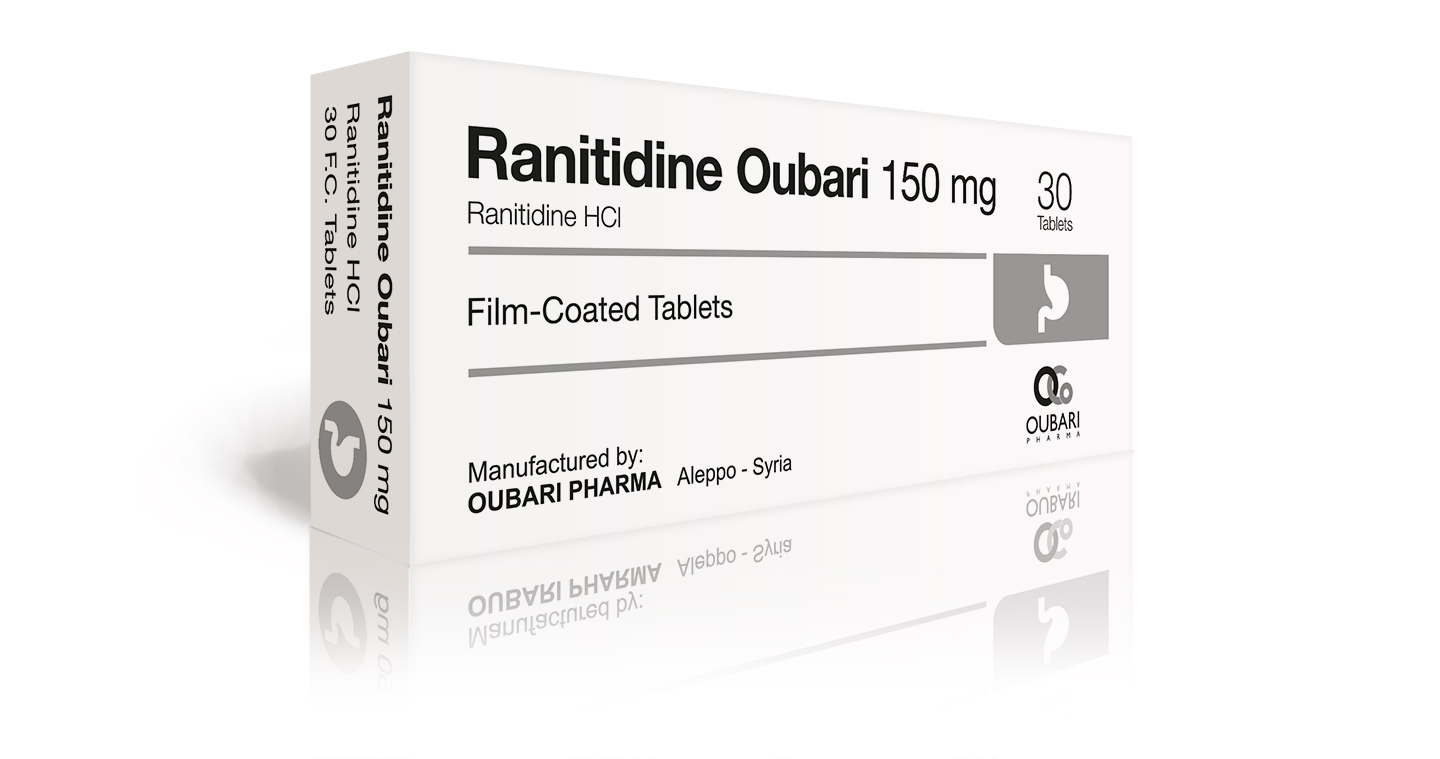Generic Name: Ranitidine HCl
Dosage Form: Tablets
License: Generic
Category: H2 receptors-antagonist
Packaging: 10 Tablets x 3 Blisters
More Info

Generic Name: Ranitidine HCl
Dosage Form: Tablets
License: Generic
Category: H2 receptors-antagonist
Packaging: 10 Tablets x 3 Blisters
*Packaging design and product name may be different in your country.
Each film-coated tablet of Ranitidine Oubari 150 mg contains:
Ranitidine Oubari is indicated in:
Active duodenal ulcer: the current recommended adult oral dosage of Ranitidine Oubari for duodenal ulcer is 150 mg tablets or 10 ml of syrup (2 teaspoonfuls of syrup equivalent to 150 mg of ranitidine ) twice daily. An alternative dosage of 300 mg tablets or 20 ml of syrup (4 teaspoonfuls of syrup equivalent to 300 mg of ranitidine) once daily after the evening meal or at bedtime can be used for patients in whom dosing convenience is important.
Maintenance of healing of duodenal ulcers: the current recommended adult oral dosage is 150 mg tablets or 10 ml of syrup at bedtime.
Pathological hypersecretory conditions (such as Zollinger-Ellison syndrome): the current recommended adult oral dosage is 150 mg tablets or 10 ml of syrup twice a day, in some patients it may be necessary to administer Ranitidine Oubari 150 mg doses more frequently, dosages should be adjusted to individual patient needs, and should continue as long as clinically indicated. Dosages up to 6 g/day have been employed in patients with severe disease.
Benign gastric ulcer: the current recommended adult oral dosage is 150 mg tablets or 10 ml of syrup twice a day.
Maintenance of healing of gastric ulcers: The current recommended adult oral dosage is 150 mg tablets or 10 ml of syrup at bedtime.
Gastroesophageal reflux disease (GERD): The current recommended adult oral dosage is 150 mg tablets or 10 ml of syrup twice a day.
Erosive esophagitis: The current recommended adult oral dosage is 150 mg tablets or 10 ml of syrup 4 times daily.
Maintenance of healing of erosive esophagitis: The current recommended adult oral dosage is 150 mg tablets or 10 ml of syrup twice a day.
Age of pediatric patients is 1 month to 16 years.
Treatment of duodenal and gastric ulcers: the recommended oral dose for the treatment of active duodenal and gastric ulcers is 2 to 4mg/kg twice daily to a maximum of 300 mg/day.
Maintenance of healing of duodenal and gastric ulcers: the recommended oral dose for the maintenance of healing of duodenal and gastric ulcers is 2 – 4mg /kg once daily to a maximum of 150 mg/kg.
Treatment of GERD and Erosive Esophagitis: a dosage of 5 to 10 mg/kg per day is usually recommended and given as 2 divided doses.
Dosage Adjustment For Patients With Impaired Renal Function: The recommended dosage in patients with a creatinine clearance < 50ml/min is 150 mg or 10 ml of syrup, every 24 hours.
Should the patient’s condition require, the frequency of dosing may be increased to every 12 hours or even further with caution. Hemodialysis reduces the level of circulating ranitidine. Ideally, the dosing schedule should be adjusted so that the timing of a scheduled dose coincides with the end of hemodialysis.
*The information provided above is general in nature and for informational purposes only. It is NOT a substitute for the advice of your doctor. You must always consult your healthcare professional before starting any medication/supplementation program.